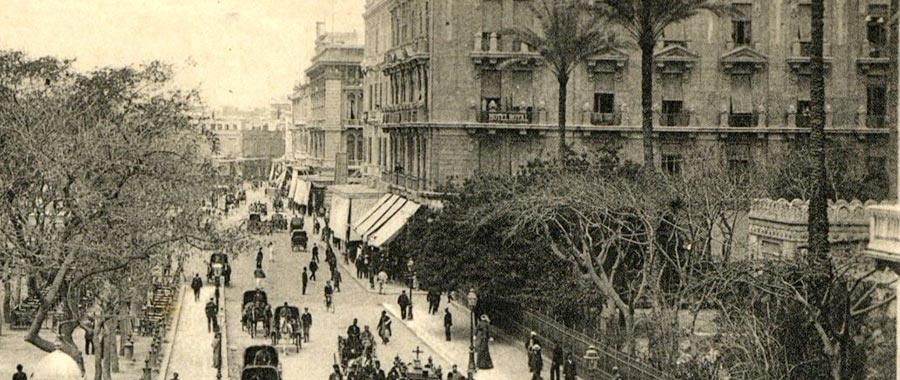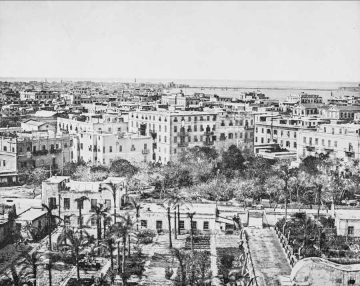The views expressed in our content reflect individual perspectives and do not represent the authoritative views of the Baha'i Faith.
Previously, we met Faris Effendi, a Syrian physician who became the first Christian Baha’i in August of 1868.
We also met the eminent Baha’i writer and historian, Nabīl-i Aʿẓam, or Nabil-i Zarandi (1831–1892), whom Abdu’l-Baha eulogized as follows:
This distinguished man was erudite, wise, and eloquent of speech. His native genius was pure inspiration, his poetic gift like a crystal stream. – Abdu’l-Baha, Memorials of the Faithful, p. 35.
Nabil’s first-hand account of Faris Effendi’s decision to become a Baha’i continues as follows:
In answer to our petitions, there was a Tablet, in the script [Mirza Aqa Jan’s quick script to take down verses as Baha’u’llah spoke them] of Revelation, a Letter from the Most Great Branch, and a paper filled by almond nuql [a sweet] … In the Tablet, Faris, the physician, had been particularly honoured.
One of the attendants had written:
Several times I have witnessed evidences of power which I can never forget. And so it was today. The ship was on the move, when we saw a boat far away. The captain stopped the ship, and this young watch-maker reached us, and called aloud my name. We went to him and he gave us your envelope. All eyes were on us and we are exiles. Yet no one questioned the action of the captain. – Nabīl-i Aʿẓam, from his unpublished history, translated by H.M. Balyuzi, Baha’u’llah, the King of Glory, p. 268.)
Now here is Baha’u’llah’s firsthand account, in full, written shortly after Baha’u’llah’s arrival in Akka:
By the name of God, the Everlasting, the Immutable.
O Thou who hast set thy gaze upon the divine countenance, hearken unto the voice of Him Who hath suffered imprisonment time and again in the path of God, thy Lord and the Lord of the worlds. Know, then, that the Ancient Beauty hath departed the Land of Mystery on account of that which hath been wrought by the hands of the oppressors. He formerly walked the land, revealing in every moment verses that enraptured the people of the Concourse on High, and expounding proofs that caused the angels nigh unto God to swoon away.
By God, the sweet-scented breezes of divine Revelation wafted over the climes of the east and west, and this is in truth an abounding grace. Upon perceiving these fragrances, the moldering bone was quickened and resurrected, in accord with the leave of God, the King, the Almighty, the All-Beauteous. Under all conditions had We placed neath every stone pearls of perspicuous utterance and gems of exposition; erelong shall there arise one who shall proclaim before every stone, “He is verily the Beloved of the Worlds!”
The days elapsed until We arrived at the shore of the sea. When the Most Great ocean embarked upon the Ark, the denizens of the Highest Paradise cried aloud in the name of God, by Whose behest it was set in motion, and addressed the Ark, saying, “Blessed art thou, inasmuch as He Who is the Hope of the Worlds hath set foot upon thee.”
Then the Ark set sail upon the sea, and We heard from every drop thereof that which no man had the power to hear, and thy Lord knoweth full well the truth of what I say. When We arrived at one of the cities of the earth, We perceived from it the fragrance of the All-Merciful, and so soon as We inhaled the breezes of holiness wafting therefrom, the sea became still and the Ark rested upon it. Yet, by God, the waves of this sea shall not be still for ever more.
Before the Divine Visage came one from amongst the community of Christ with an eloquent missive in hand. Upon breaking the seal, We perceived the perfumes of sanctity from one who had been set aflame by the fire of the love of thy Lord, the All-Merciful. So carried away was he by the ecstasies of Revelation, that he severed himself from all things and held fast unto the cord which was suspended betwixt heaven and earth. We read the words of his missive, and whosoever desireth may read it, that he may thus behold how the fingers of the power of thy Lord, the Most Exalted, the Almighty, the All-Powerful, can turn the hearts of men towards Him.
O would that thou hadst stood before Us and heard the Youth recite that missive in the intonation of God, the Omnipotent, the Almighty, the All-Wise! In such wise doth God create what He willeth as a token of His might, yet the people, wrapt in the veils of self, are among the heedless. By God, the creation of that man is greater in the sight of God than the creation of the heavens and earth. When thou dost read his missive, exclaim: “Exalted be God, Who quickeneth whom He will in His might; He is verily the Quickener of the Worlds!” – provisional translation by Joshua Hall, reference courtesy of Omid Ghaemmaghami, April 27, 2017.
This remarkable tablet from Baha’u’llah begins by addressing the recipient, Raḍ’ar-Ruḥ (or “Contented Spirit,” a name given to Mulla Muḥammad-Riḍa-yi Manshadi by Baha’u’llah).
Presumably, at that time, there was no immediate contact with Faris Effendi himself, but this tablet from Baha’u’llah (the “Ancient Beauty”) refers to his multiple imprisonments in times past and to the first Christian to become a Baha’i. En route to yet another prison, Baha’u’llah continued to reveal scriptures of divine wisdom, stirring the souls of receptive readers.
Baha’u’llah characterizes his revelation as universal in scope (“the sweet scented breezes of divine Revelation wafted over the climes of the East and West”), with power to revive the spiritually dead (“the moldering bone was quickened and then resurrected, in accord with the leave of God”). This reference to resurrection has a spiritual, not a physical, meaning.
Baha’u’llah then uses the metaphors of “pearls” and “gems” placed under “every stone” (hardened hearts). Next, Baha’u’llah compares the Austrian Lloyd steamer to Noah’s “Ark,” which, in Baha’i symbolism, represents the community of the spiritually awakened—in this case, the followers of Baha’u’llah.
Baha’u’llah then alludes to Alexandria (“one of the cities of the earth”). The “one from amongst the community of Christ” who came to Baha’u’llah was Constantine the Watch-Maker, who brought “an eloquent missive in hand,” the letter by Faris Effendi to Baha’u’llah.
The text of Baha’u’llah’s tablet does not clearly distinguish between Constantine and Faris. In a sense, these two individuals appear together, the one representing the other. Attaining the presence of Baha’u’llah, and experiencing his divine majesty and charismatic power, had a great effect on Constantine, who was stirred to the depths of his soul “by the ecstasies of Revelation.” As for the letter by Faris himself, Baha’u’llah states that “whosoever desires may read it.” How? By attaching the contents of the letter to the end of his tablet, Baha’u’llah made it available for all of us. In the next essay in this series, we’ll read Faris Effendi’s letter.

















Comments
Sign in or create an account
Continue with Googleor